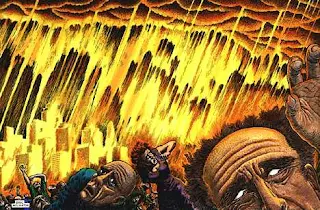I don't think this is a splinter group of the old WCG, but just a group that took WCG's name and incorporated into theirs.
Nor do I think they realize how appropriate their web page banner is in it's description of Armstrongism. Though HWA's vision was grand, it is quit obvious now that facts NEVER mattered! Though Dave Pack's and Gerald Flurry's vision may be big, facts have never mattered.
Oh wait, that seems to be what's wrong with most of Christianity! Facts never matter. Fluff, literalism, speculation, false prophecies, bigotry, homophobia, racism, stupid apostles and aberrant doctrines do.
It sure sounds like a happening group! One Accord Worldwide Church of God, Inc.
"Apostle Wesley is a SPIRITUAL PARAMEDIC that helps resuscitate them back to life by providing a healing and delivering WORD of GOD.
"In January 2012, Friendship Worldwide Fellowship Ministries merged with One Accord Holiness Church; thus creating One Accord Worldwide Church of God, Inc., where the Presiding Bishop is Dr. John D. Wesley and Apostle serves as the Diocesan."
"



